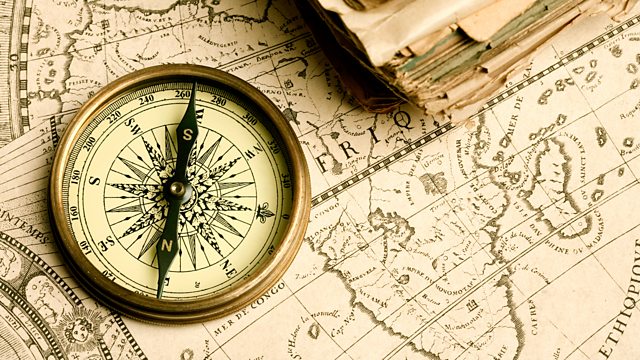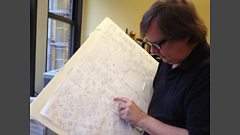Aleks Krotoski examines what digital mapping has meant for our understanding of the world. Are we always aware of the decisions that make them look the way they do?
Aleks Krotoski examines what digital mapping has meant for our understanding of the world. Are we always aware of the decisions that make them look the way they do? Traditionally of course maps are as "authored" as anything else. As Simon Garfield writer of On the Map: Why the world looks the way it does , explains we should think of maps like the biography of a famous person; highly subjective and usually with some sort of angle.
We hear this authorship at work when we join Bob Egan of PopSpotsNYC; he maps out where famous album cover photos were taken in his native New York and puts them online for us all to visit. We join him on the hunt through Google maps and on the streets as tracks down his latest quarry. Bob is adding his own layer of information to the digital mapping of our world for Dr Mark Graham of the Oxford Internet Institute this is happening all around us.
And it's this phenomenon that makes the understanding of the choices that go into making our maps even more important. We hear about the experience of paleo-anthropologist Prof Lee Berger and how hidden choices in GPS data he was using nearly cost him the most important discovery of his career. Aleks then explores if the so called "open mapping" movement hold the answer to eliminating some of issues created by digital maps with the example of Christchurch recovery map -a crowd sourced map that was created within hours of the Christchurch earth quake of 2012.
Last on
More episodes
Previous
Next
Clip
-
![]()
The quest for Judy Collins
Duration: 02:23
Music Played
-
![]()
Sinoia Caves
Elena's Sound-World
- Beyond the Black Rainbow.
-
![]()
The Dust Brothers
Hessel Raymond K
- Fight Club.
-
![]()
Ulysses Flashman
Panda of Gold
- The procession of Harlots.
-
![]()
The Who
The kids are Alright
- My Generation.
-
![]()
Steely Dan
Pretzl Logic
- Pretzl Logic.
-
![]()
Judy Collins
Like a Rolling Stone
- Judy Sings Dylan ... Just like a Woman.
-
![]()
Melody’s Echo Chamber
Quand Vas tu Rentrer
- Melody's Echo Chamber.
-
![]()
Tunng
Bodies
- Comments of the Inner Chorus.
-
![]()
melodium
I've been there before
- My Mind is falling to Pieces.
Simon Garfield

is the author of ‘On the Map: Why the world looks the way it does’. He explains why a map is not always just a chart of land, but a biography of our past.
Dr. Mark Graham

is an Associate Professor and Senior Research Fellow at the Oxford Internet Institute and contributor to the Guardian.
He tells us how layers of information are added to maps in the digital age, and explains why some areas of the world are so lacking in information.
Bob Egan

Bob is the Sherlock Holmes of pop culture. When he isn’t working or writing books, he hunts down the locations where classic album covers were photographed for his website .
We join Bob as he hunts down the location of ‘Judy Collins Sings Bob Dylan’.
Paula Williams

Paula is a Senior Map Curator at the , with a particular interest in Polar Maps.
She shows us some historical maps, and explains how influential the cartographer’s were in making the map, and why the world seemed so different to people in the past.
Tim McNamara

is an independent data scientist, artist and technology writer, who in 2011 created the Christchurch recovery map.
He tells us how he created the map, and what it did to help people affected by the disaster.
Rachel Graham

is a reporter for Radio New Zealand. A resident of Christchurch, she reported on the 2011 earthquake and followed the continuing reconstruction of the city.
She takes us round the city, explaining what it was like in the immediate aftermath of the quake and how much still needs to be done.
Manik Gupta

Manik leads , a project to build the most accurate and in-depth maps for countries around the world. Â
He tells us how Google Maps work to achieve accuracy in a constantly changing worldProfessor Lee Berger
is the Reader in Human Evolution and the Public Understanding of Science at the  Institute for Human Evolution, School of GeoSciences, University of the Witwatersrand.
He shares the story of how he almost lost the most important discovery of his carreer due to GPS.
Broadcasts
- Mon 10 Nov 2014 16:30Â鶹ԼÅÄ Radio 4
- Thu 1 Oct 2015 23:30Â鶹ԼÅÄ Radio 4
Featured in...
![]()
Mapping the World
A collection of programmes relating to maps.
Podcast
-
![]()
The Digital Human
Aleks Krotoski explores the digital world






